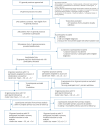The effectiveness of a primary care-based collaborative care model to improve quality of life in people with severe mental illness: PARTNERS2 cluster randomised controlled trial
- PMID: 37078520
- PMCID: PMC10201334
- DOI: 10.1192/bjp.2023.28
The effectiveness of a primary care-based collaborative care model to improve quality of life in people with severe mental illness: PARTNERS2 cluster randomised controlled trial
Abstract
Background: Individuals living with severe mental illness can have significant emotional, physical and social challenges. Collaborative care combines clinical and organisational components.
Aims: We tested whether a primary care-based collaborative care model (PARTNERS) would improve quality of life for people with diagnoses of schizophrenia, bipolar disorder or other psychoses, compared with usual care.
Method: We conducted a general practice-based, cluster randomised controlled superiority trial. Practices were recruited from four English regions and allocated (1:1) to intervention or control. Individuals receiving limited input in secondary care or who were under primary care only were eligible. The 12-month PARTNERS intervention incorporated person-centred coaching support and liaison work. The primary outcome was quality of life as measured by the Manchester Short Assessment of Quality of Life (MANSA).
Results: We allocated 39 general practices, with 198 participants, to the PARTNERS intervention (20 practices, 116 participants) or control (19 practices, 82 participants). Primary outcome data were available for 99 (85.3%) intervention and 71 (86.6%) control participants. Mean change in overall MANSA score did not differ between the groups (intervention: 0.25, s.d. 0.73; control: 0.21, s.d. 0.86; estimated fully adjusted between-group difference 0.03, 95% CI -0.25 to 0.31; P = 0.819). Acute mental health episodes (safety outcome) included three crises in the intervention group and four in the control group.
Conclusions: There was no evidence of a difference in quality of life, as measured with the MANSA, between those receiving the PARTNERS intervention and usual care. Shifting care to primary care was not associated with increased adverse outcomes.
Keywords: Primary care; bipolar affective disorders; outcome studies; randomised controlled trial; schizophrenia.
Conflict of interest statement
R.B. received additional support from the National Institute for Health Research (NIHR) Applied Research Collaboration South West Peninsula. M.B. received additional support from the NIHR Applied Research Collaboration East Midlands and is partly supported by NIHR Applied Research Collaboration West Midlands. R.B., V.P. and M.B. received an NIHR Policy Research Programme grant to examine the implementation of PARTNERS. R.B. is a member of the Health Technology Assessment Prioritisation Committee A. All remaining authors have no conflicts of interest to declare.
Figures
References
-
- Perälä J, Suvisaari J, Saarni SI, Kuoppasalmi K, Isometsä E, Pirkola S, et al. Lifetime prevalence of psychotic and bipolar I disorders in a general population. Arch Gen Psychiatry 2007; 64(1): 19–28. - PubMed
-
- Wood L, Alsawy S. Recovery in psychosis from a service user perspective: a systematic review and thematic synthesis of current qualitative evidence. Community Ment Health J 2018; 54: 793–804. - PubMed


